|
|
|
Sort Order |
|
|
|
Items / Page
|
|
|
|
|
|
|
| Srl | Item |
| 1 |
ID:
180047
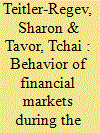

|
|
|
|
|
| Summary/Abstract |
COVID-19 pandemic created a health emergency that led to a huge global economic crisis. This article examines the effects of a wide range of variables including the number of infections, deaths, and recoveries, as well as categorical variables like public behaviour and government restrictions on stock indexes on 16 different countries. It compares the situation in Israel with the other explored countries. The regression analysis revealed that while in Israel all the variables affected stock-index returns, in the other countries only a few of the variables did so.
|
|
|
|
|
|
|
|
|
|
|
|
|
|
|
|
| 2 |
ID:
180058
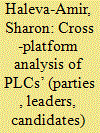

|
|
|
|
|
| Summary/Abstract |
This article analyzes social media presence of all parties, leaders, and candidates (PLCs) during Israel’s 2015 electoral campaign, within a transformational era for online campaigns. The article adheres to the theoretical frameworks of normalisation/equalisation hypotheses and personalised politics. Its research design is based on a cross-platform analysis. Findings indicate not only a centralised personalisation trend but rather a depersonalised web sphere. Leaders are more prominent online compared to other candidates; and parties out-perform their leaders, too. Furthermore, findings point to a normalised web sphere, even when referring to new and trendy platforms, revealing that the chances of political newcomers entering the parliamentary arena are scarce.
|
|
|
|
|
|
|
|
|
|
|
|
|
|
|
|
| 3 |
ID:
180061


|
|
|
|
|
| Summary/Abstract |
Prior studies presented conflicting findings on the effect of small and medium enterprises (SMEs) concentration on growth rate. A theoretical model of industrial organisation suggested that imperfect competition – having fewer competitors – yields a higher growth rate. This research explores this relationship theoretically and empirically as related to SMEs in Israel. Findings show that having few competitors has a positive significant effect on growth in the number of employees, however, unexpectedly the subsample of SMEs with no competitors did not present any growth advantage. We apply a classic microeconomic analysis and demonstrate the conditions that support this empirical result.
|
|
|
|
|
|
|
|
|
|
|
|
|
|
|
|
| 4 |
ID:
180050
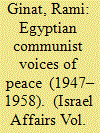

|
|
|
|
|
| Summary/Abstract |
This article sets out to closely scrutinise the main phases of the campaign for peace (1947–58) undertaken by left-wing Egyptian groups. Based on exclusive first-hand Egyptian communist primary sources – archival and others, it shows that although the communists were the only Egyptian political groups to support the November 1947 UN partition resolution on Palestine, President Gamal Abdel Nasser later, during the Bandung Conference (1955), followed suit yet no concrete official actions were taken by neither the Egyptian nor the Israeli political elites before the 1956 Suez War. Following that war, the prospects for an Egyptian–Israeli peace settlement were shut off for nearly two decades.
|
|
|
|
|
|
|
|
|
|
|
|
|
|
|
|
| 5 |
ID:
180062


|
|
|
|
|
| Summary/Abstract |
In the first elections for the Israeli parliament (January 1949) WIZO ran as a women's party seeking equal rights for women. It won enough votes for a parliamentary seat – highly unusual in that day and age. WIZO was unique in that it started out as an apolitical women's organisation aligned with the mid-stream Zionist consensus and redefined itself as a party fighting for gender equality.This article examines the developments in the General Zionist Party that led WIZO, founded as a women's philanthropic organisation, to run as an independent political party on its own platform on the eve of the establishment of the State of Israel. It will also look at the impact of WIZO party on Israel's center-right - the General Zionists, the Progressive party and Herut - in the context of the Constituent Assembly elections. The establishment of a women's party in 1948-49 was a unique phenomenon with no equal anywhere in the world at the time.
|
|
|
|
|
|
|
|
|
|
|
|
|
|
|
|
| 6 |
ID:
180044
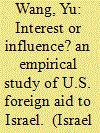

|
|
|
|
|
| Summary/Abstract |
Research on the determinants of U.S. foreign aid to Israel is commonly motivated by two contesting theoretical paradigms. Pioneered by Organski, the self-interest paradigm conceptualises aid as a mutually beneficial deal that helps the U.S. to advance its interest in the Middle East. The influence paradigm, best showcased by Mearsheimer and Waltz, views U.S. aid to Israel as a corollary of the overwhelming influence of pro-Israel interest groups on U.S. foreign policy decision-making. This article attempts to shed new light on the debate by using systematic data analysis. The results show consistent evidence in support of the self-interest paradigm.
|
|
|
|
|
|
|
|
|
|
|
|
|
|
|
|
| 7 |
ID:
180066
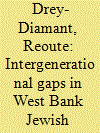

|
|
|
|
|
| Summary/Abstract |
This article examined the differences between the political attitudes of two generations of religious Zionists settlers in the West Bank. Theoretical approaches on intergenerational socialization were reviewed, predicting trends of continuity vis-à-vis change in intergenerational attitudes. Also, previous studies of the religious Zionist sector subgroups, the settlements, and their residents were reviewed. The study was conducted with a quantitative method, while the research tool was an online research questionnaire. The study findings verify the research hypothesis regarding the intergenerational differences in political attitudes, as most issues that were examined found that the younger generation holds more hawkish attitudes in comparison to their parents. Finally, the young Torani were emphasized in the research as the secondary group of settlers who, in most cases, hold the most extreme political attitudes.
|
|
|
|
|
|
|
|
|
|
|
|
|
|
|
|
| 8 |
ID:
180042
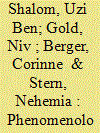

|
|
|
|
|
| Summary/Abstract |
This article analyses the experiences of IDF soldiers involved in subterranean operations in Gaza. While tunnel warfare is a central element in warfare, few sociological studies have focused on this element of combat. In-depth interviews reveal the day-to-day experiences of the specialised combat engineering units tasked with subterranean operations during the past two decades. The themes identified are: ‘Operational activity in tunnels as an experience’, ‘Courage and danger’, ‘Selection and classification of manpower’ and ‘Accumulating experience’. An awareness for generational differences in the narratives allows an analytical model based on four different models for organising forces for operations in tunnels.
|
|
|
|
|
|
|
|
|
|
|
|
|
|
|
|
| 9 |
ID:
180045
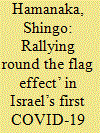

|
|
|
|
|
| Summary/Abstract |
This article analyzes the surge in support for PM Benjamin Netanyahu during the first wave of the coronavirus pandemic in Israel within the framework of the rally effect. Israel was chosen as a case study for two reasons. First, the country was repeatedly polled during the first wave of infection. Second, a strict compartmentalised lockdown limited to certain areas, as a natural experimentation, had been in place for some time. These two factors fresh important light on the circumstances under which a society supports its political leaders during a national crisis.
|
|
|
|
|
|
|
|
|
|
|
|
|
|
|
|
| 10 |
ID:
180053


|
|
|
|
|
| Summary/Abstract |
This interview with Swedish State Secretary for Foreign Affairs Annika Söder (2014–19) discusses her involvement in the Israeli-Palestinian peace process, and Sweden’s relationships with Israel and the Palestinian Authority. The interview assesses the positive and negative lessons and implications of the peace process, Sweden’s involvement in the peace process, and the likelihood of bringing the Israeli-Palestinian conflict to a close.
|
|
|
|
|
|
|
|
|
|
|
|
|
|
|
|
| 11 |
ID:
180043
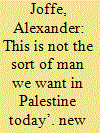

|
|
|
|
|
| Summary/Abstract |
The decision-making process behind the appointment of General Alan Cunningham as High Commissioner of Palestine in November 1945 to replace Field Marshal Lord Gort has been difficult to explain. Cunningham’s record as a failed wartime general and backwater administrative commander were scant preparation for an important political position in Mandatory Palestine. Newly located files indicate Vice Chief of the Imperial Staff Archibald Nye listed Cunningham among a series of possible candidates for consideration by Prime Minister Clement Atlee. Terror attacks in Palestine, American pressure over Jewish refugees, the need to secure additional American loans, and the covert Anglo-French intelligence war in the Middle East, pressured Atlee to make a quick decision. After some confusion Cunningham was selected and Chief of the Imperial General Staff Alan Brooke approved. Haste and personal connections therefore brought about a critical appointment that shaped the end of the Mandate.
|
|
|
|
|
|
|
|
|
|
|
|
|
|
|
|
|
|
|
|
|